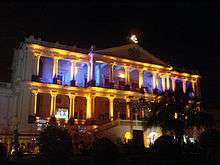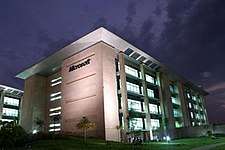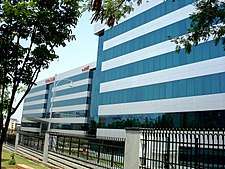Economy of Hyderabad
The economy of Hyderabad, the capital of Telangana, India, is based on traditional manufacturing, the knowledge sector, and tourism.[1] Starting in the 1990s, the economic pattern of the city changed from a primarily service hub to a more diversified economy,[2] but the service industry remains a major contributor.[3] As of 2006, the largest employers of Hyderabad are the governments of Andhra Pradesh and India, with 113,000 and 85,000 employees, respectively.[4]
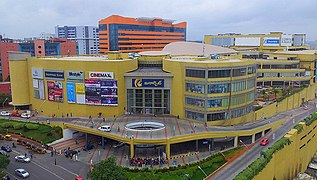

Since its inception in 1591, Hyderabad has been a global trade center in multiple areas, including its status as the world's only diamond market. City-based handicrafts were sold in the Middle East and Western countries. During the rule of the Nizam's in the 1930s, industrial growth started with the establishment of a diversified industrial zone, which grew in parallel with traditional manufacturing.
In the 1930s and 1940s, city-based industries started importing technology from the western world for industrial manufacturing. With the introduction of the railways, the city became well connected with the port cities of Bombay (Mumbai), Madras (now Chennai), Calcutta (now Kolkata) and Karachi (now in Pakistan).[5][6] During the 1950s and 1960s, most of the Indian premier public enterprises—BHEL, NMDC, HMT, BEL, IDPL, ECIL, DRDO and HAL—were established in Hyderabad, changing the economical pattern of the city from a traditional manufacturing to a cosmopolitan industrial service sector.[7]
Hyderabad is the capital of Telangana, and the city is the largest contributor to the state's GDP (Gross domestic product) and state tax.[8] In 2011, Hyderabad generated revenues of ₹700,000 million (US$9.8 billion) and contributed a third of the state's tax revenue.[9] In 2008, the GDP (PPP) was US$60bn, placing the city fourth in India and 93rd in the world.[10][3] Hyderabad and its suburbs house the highest number of special economic zones among India's cities.[11]
In the 1970s, the pharmaceutical and electronic industries were established in the city because of its strategic location in south-central India, for which it is known as the gateway to south-central India.[7][12][13] Since the 1990s, the economic patterns of the city have changed it from a primarily service hub to a more diversified spectrum,[2] with the growth of IT enterprises, and biotech, insurance, and financial institutions, and a strong employment base in ancillary activities such as trade and commerce, transport, storage, communication, real-estate and retail, which employ three times more people than the IT industries.[6] As of 2020, Hyderabad has six lakh employees in the IT/ITES sector, working in more than 1500 companies.[14][15][16][17] The service industry in this arena remains a dominant, with 90% of the workforce.[13][18] As of 2005, out of every 1000 people of working age, 770 males and 190 females are employed.[19]
Tourism
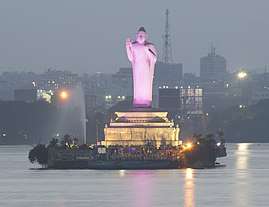
In March 2012, The Indian Union Tourism Ministry declared Hyderabad as the first ever "Best Heritage City of India".[20]
Hyderabad was the World's third best city to visit in 2013, according to Lonely Planet. In 2011 the city was ranked nineteenth in the world by The New York Times in The list of 41 Places to Go in 2011, the only Indian City in the list.[21] Hyderabad is known as the City of Pearls, due to the presence of pearls trading industry—until the 18th century the city was the only global trade center of large diamonds.[22][23] Many traditional and historical bazaars are located in the city.[24][25] The Laad Bazaar and nearby markets have shops that sell pearls, diamonds and other traditional ware and cultural antiques.[24]
Biopharmaceutical industry
Hyderabad emerged as a pharmaceutical and biotechnology hub and is known as India's pharmaceutical capital and "Genome Valley of India".[26][27] In 2008–2009, Hyderabad's bio-pharmaceuticals exports reached US$3.1 billion.[28] The south—central location of Hyderabad, and the incorporation of Indian Drugs and Pharmaceuticals Limited (IDPL) in 1961 proved to be a foundation of pharmaceutical industry in Hyderabad, later in the 1990s the expansion in the industry took place with the formation of Indian Institute of Chemical Technology, National Institute of Pharmaceutical Education and Research, the Centre for Cellular and Molecular Biology and National Institute of Nutrition along with the regional institutions making Hyderabad the hub of pharmaceutical and biotechnology in India.[29]
The establishment of the public sector in biotechnology and the Genome Valley, 'Fab City' and the 'Nano Technology park' established significant infrastructure in bio-technology. These attributes attracted regional companies and MNCs to set up offices, warehouses, research and development centres in the city.[30] In 2012, the city hosted the Convention on Biological Diversity (2012 COP 11).[31]
The commercial market structure of Hyderabad is defined into 4 sectors—The Central Business Districts (CBD), the sub-central business centres, the neighbourhood business centres and local business centres.[32] Since 2007, The retail industry in Hyderabad is on the rise,[33] and several central business districts are spread across the city.[34][35]
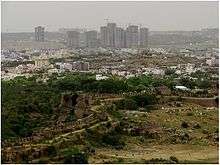
Retail and real estate
The World Bank Group ranked the city as the second best Indian city for doing business in 2009.[36] In 2010, the economic analysis group GaWC ranked Hyderabad in its third tier (Gamma+ World City) of cities by importance.[37] In 2011, DTZ ranked Hyderabad as world's third most affordable office location,[38] while Business Today ranked Hyderabad as the fourth best city to live in India.[39] Hyderabad witnessed a high growth in the real estate business, making it among the top five concentrated cities for housing in India.[40] In 2007–08, the city's prime residential areas of Banjara Hills and Jubilee Hills reached the highest growth percentage in India. The Economic Times evaluated Banjara Hills to be worth US$20.7 billion.[41]
Information technology
Hyderabad is among the global centres of information technology for which it is known as Cyberabad (Cyber City).[42][43] The city's IT sector includes the IT-enabled services, business process outsourcing, entertainment industries,[43] and Financial services.[44] During 2008–09, Hyderabad's IT exports reached US$ 4.7 billion,[28] and 22% of the NASSCOM's total membership is from Hyderabad.[11] The development of a township with related technological infrastructure called HITEC City prompted global and particularly US—based companies to establish their operations in Hyderabad.[42] The Deloitte, Franklin Templeton Investments, GE Capital, Accenture, HSBC, Bank of America, ABN Amro, S&P Capital IQ, Ernst & Young, KPMG, Capgemini, Genpact are some of the financial services companies with offices in the city.[44]
The IT exports from Hyderabad stood second in the country at ₹128,807 crore (US$15 billion) in FY 2019-20 improving from previous year ₹109,219 crore ($14 billion, 17.93% CAGR) in FY 2018–19.[45][46] The major multinational IT firms located in Hyderabad are Microsoft (the largest R&D campus outside the US), Google, Thoughtworks, CA Technologies, Amazon.com, IBM, Motorola, Samsung, Agilent, Automatic Data Processing, Oracle Corporation, Yahoo!, Dell, Texas Instruments, Hewlett-Packard, Virtusa, Kewill, Facebook and others.[44][47] The major Indian firms with development centres in the city are Tech Mahindra, Infosys, Wipro, Cognizant, Tata Consultancy Services, Polaris, and others.[44] The main areas where such IT and ITeS campuses have been set up are Madhapur, Gachibowli, Kondapur and Uppal.[48] Apple announced the opening of a new office in Hyderabad that will focus on development of its Maps product.[49]
Information Technology Investment Region (ITIR)
The Information Technology Investment Region (ITIR), Hyderabad is an upcoming IT investment region jointly being developed by Government of India and Government of Telangana.[50] The Union government has given in-principle approval on Sept 8th, 2012 for the Information Technology Investment Region (ITIR) for development of self-contained integrated knowledge clusters for growth of IT and electronic hardware manufacturing in 50,000 acres in and around Hyderabad.[51] The project which is modeled along the lines of Shenzhen SEZ in China, is aimed at attracting an investment of Rs 2.19 trillion ($44 billion) in the IT, ITES and electronics sectors and providing direct employment to 1.5 million people.
Under the mega project, special economic zones (SEZs), industrial parks, free trade zones, warehousing zones and export-oriented units would come up in three corridors around the city which includes the areas Madhapur, Gachibowli, Uppal, Mamidipalli, Raviryal, Adibatla and Maheswaram, and Pocharam. The Government proposed to develop the infrastructure for ITIR at an estimated cost of over Rs 2.19 lakh crore.
On 20 September 2013 the Central Government gave the official approval for the ITIR project[52]
In April 2016, the Central Government informed Telangana state Government that it would revise the entire plan. This, according to sources, may lead to the delay in the estimated investments of Rs 3 lakh crore and creation of nearly 60 lakh jobs. No explanation given on why the need for revise plan.
References
| Wikimedia Commons has media related to Economy of Hyderabad, India. |
- "Travel,tourism fair begins". The Hindu. Chennai, India. 9 July 2011. Retrieved 19 June 2017.
- Rao, Nirmala (2007). Cities in transition. Routledge. pp. 117–140. ISBN 0-203-39115-2.
- "GDP: The top 10 cities in India". Rediff.com. 23 April 2010. Retrieved 21 October 2011.
- "Employee census 2006". Directorate of Economics and Statistics, Andhra Pradesh Government. 2006. Archived from the original on 26 December 2010. Retrieved 17 May 2010.
- "Census of central government employees" (PDF). Ministry of Labour, Government of India. 2003. Archived from the original (PDF) on 8 July 2010. Retrieved 17 May 2010.
- "Other Albion CX19". Albion CX19 Restoration Project. Retrieved 18 June 2012.
- Economy, population and urban sprawl (PDF). Urban Population, Development and Environment Dynamics in Developing Countries. 13 June 2007. pp. 7–19. Retrieved 18 June 2012.
- "Brand Hyderabad loss of gloss?". The Times of India. 14 November 2011. Retrieved 18 June 2012.
- "India's 25 most competitive cities". Rediff.com. 10 December 2010. Retrieved 10 December 2010.
- "Civic infra bodies get a raw deal in Budget". The Times of India. 20 February 2012. Retrieved 18 April 2012.
- "Country briefing: India–economy (III-local economy)". Massachusetts Institute of Technology. 1 September 2010. Retrieved 16 May 2012.
- "Heat on Hyderabad". The Times of India. 12 July 2011. Retrieved 19 April 2012.
- "Hyderabad airport set to become air passenger hub, pips Nagpur". The Indian Express. 4 February 2012.
- Gopal K, Bhargava; S.C, Bhatt (2006). Land and people of Indian states and union territories. Kalpaz Publication. pp. 330–399. ISBN 81-7835-358-X.
- "Lay-offs loom over IT/ ITES sector in Hyderabad, Telangana govt".
- "IT staff strength in Telangana to double to 10 lakh in 3–4 years".
- "Hyderabad overtakes Bengaluru in IT office space occupation".
- "Hyderabad IT companies told to gradually ramp up operations".
- "Country briefing:India–economy". Massachusetts Institute of Technology. 1 September 2010. Retrieved 18 June 2012.
- "Employment-unemployment situation in million plus cities of India" (PDF). Delhi Government. 2005: 15. Archived from the original (PDF) on 12 August 2011. Retrieved 18 June 2012. Cite journal requires
|journal=(help) - "Heritage award for Hyderabad raises many eyebrows". The Times of India. 2 March 2012. Retrieved 20 March 2012.
- "The 41 places to go in 2011". The New York Times. 7 January 2011. Retrieved 20 August 2011.
- Waldemar, Hansen (1972). The Peacock throne:the drama of Mogul India. Motilal Banarsidass. p. 168 and 471. ISBN 978-8120802254.
- Bruyn, Bain, Allardice and Joshi (2010). Frommer's India. Wiley Publishing. p. 403. ISBN 978-0-470-55610-8.CS1 maint: multiple names: authors list (link)
- "Hyderabad in NYT 2011 list of must see places". The Times of India. 26 January 2011. Retrieved 17 July 2011.
- "Laad bazaar traders cry foul". The Hindu. 22 February 2008. Retrieved 22 February 2008.
- Abram and Edwards (1982). The rough guide to south India. The Penguin Group. p. 553. ISBN 1-84353-103-8.
- "Glory of the gates". The Hindu. 10 March 2004. Retrieved 11 October 2011.
- "Hyderabad: India's genome valley". Rediff.com. 30 November 2004. Retrieved 13 June 2011.
- "Hyderabad is a hot destination for Walsh". The Daily Telegraph. 25 January 2009. Retrieved 18 October 2011.
- "Brand Hyderabad, takes a hit in Indian unrest". The Daily Telegraph. 5 January 2010. Retrieved 18 October 2011.
- Pletcher, Kenneth (2011). The Geography of India: Sacred and Historic Places. Britannica educational publishing. p. 188. ISBN 9781615302024. *Felker, Greg; Chaudhuri, Shekhar; György, Katalin (1997). The pharmaceutical industry in India and Hungary. World Bank Publications. pp. 9–10. ISSN 0253-7494.
- "Job market booming overseas for many American companies". Huffington Post. 28 December 2010. Retrieved 6 October 2011.
- "COP-11:centre mum on Rs. 1,000cr funds". Asian Age. 12 May 2012. Retrieved 15 May 2012.
- Peter, Scott (2009). Geography and retailing. Rutgers University Press. pp. 137–138. ISBN 978-0-202-30946-0.
- "Hyderabad, Chennai & Bangalore witness high rental growth: retail survey". the Hindu Business Line. 16 November 2001. Retrieved 16 November 2007.
- "Despite Telangana heat, city's information technology cup brimming over: report". The Times of India. 6 May 2012. Retrieved 6 May 2012.
- "Will the real central hub stand up?". The Hindu. 23 July 2005. Retrieved 11 October 2011.
- "Ease of doing business in Hyderabad – India (2009)". World Bank Group. Retrieved 8 February 2011.
- "The world according to GaWC 2010". Loughborough University. 2011. Archived from the original on 10 October 2013. Retrieved 26 December 2011.
- "Hyderabad 3rd most affordable office location in 2011: study". Deccan Chronicle. 22 April 2012. Retrieved 22 April 2012.
- "Best cities to work, play and live". Business Today. 27 August 2011. Retrieved 28 August 2011.
- "Realty boom squeezes veg supply to city". The Times of India. 27 June 2011. Retrieved 21 October 2011.
- "Industry outlook and performance review of housing finance companies and the Indian mortgage finance market for 2010–11" (PDF). ICRA Limited. 2011. Retrieved 15 May 2012.
- "Check out India's most expensive boulevard". The Economic Times. 26 August 2007. Retrieved 7 October 2011.
- Roy and Ong (2011). Worlding cities: Asian experiments and the art of being global. John Wiley & Sons. p. 253. ISBN 978-1-4051-9277-4.
- "An Amazon shot for city". The Times of India. 13 October 2011. Retrieved 13 October 2011.
- Manish Telikicherla, Chary (2009). India:nation on the move. iUniverse.com. pp. 247–248. ISBN 978-1-4401-1636-0-.
- "Survey of child labour in slums of Hyderabad: final report" (PDF). Center for Good Governance, Hyderabad. 17 December 2008. Archived from the original (PDF) on 29 June 2012. Retrieved 16 May 2012.
- "Telangana records 17.93% growth in IT sector". The Times of India. 21 May 2020. Retrieved 21 May 2020.
- "Telangana IT exports race past Rs 1 lakh crore". The Times of India. Retrieved 25 March 2018.
- "Tour Google India". CNN. 23 October 2007. Retrieved 5 October 2011.
- "The top five cities". Business Today. 27 August 2011. Retrieved 9 September 2011.
- "Our office locations". Microsoft. 2011. Retrieved 9 September 2011.
- "New security for Hyd software firms". The Times of India. 20 July 2007. Retrieved 15 September 2011.
- "Google offices –company". Google. 2004. Retrieved 17 May 2012.
- "Hyderabad's software hub shines brightly". The Times of India. 22 February 2012. Retrieved 22 April 2012.
- "Apple opens Development Office for Maps in Hyderabad". The Indian Express. 19 May 2016. Retrieved 19 May 2016.
- "Centre approves ITIR project in Hyderabad". The HIndu.
- "Hyderabad to get 50,000-acre IT hub". TOI.
- "Hyderabad IT investment region in 50k acres". The Indian Express.
